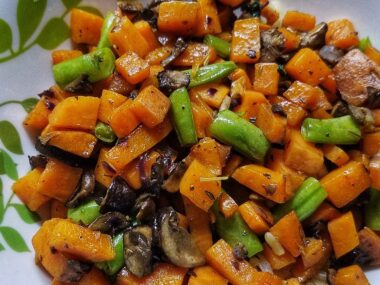How to handle holiday food if challenged by a chronic illness
With lupus, seasonal feasts may turn out to be culinary minefields
Written by |

Having moved to the Blue Ridge Mountains not long ago, I’m finally experiencing that time of year when the leaves change and the air gets chilly. My time of year has arrived.
You see, I learned many years ago, through journaling, that heat and sun are two of my biggest triggers for more and worsening lupus symptoms, so I typically hide in my home during spring and summer. Then, during fall and winter, I usually feel the strongest and have the least number of lupus-related issues.
What also makes this time special for me (besides the cold weather) are the holidays, of course. Coming from a large Italian family, I’m used to having a lot of people in the home, laughing, talking loudly, and cooking and eating all sorts of food.
My love for and relationship with food, though, has no doubt been influenced by lupus and some ongoing stomach issues. If you also suffer with issues like these, or a restrictive diet from allergies or inflammatory diseases, you know that getting through the food portion of the holidays can feel like walking through a culinary minefield.
Our society portrays the holiday season as a cherished, magical time filled with gatherings and festive meals, but for those of us living with lupus and other chronic illnesses, it’s often a time of navigating events with foods we can’t eat, leaving us to plan ways to stay comfortable and safe.
Atop all that, for me, is when family members and friends bring elaborate culinary dishes over for events. If you know anything about Italians, you might know they can feel a little insulted if you don’t eat their food. I always felt terrible if I didn’t try a food and thus made some cook feel bad — so I’d eat some and pay for it for days or weeks afterward.
Times have changed
Today I have a hard boundary against this polite eating and try to navigate the holidays in a way that keeps me safe. Here are some of the best tips I’ve learned along the way.
If hosting at your home: Whenever possible, I try to have all events at my house, for several reasons. First, it helps me maintain a level of energy and rest that traveling typically takes out of me. I’m able to nap or take a break when preparing for the big day. It also allows me to cook foods that are safe for me and more traditional meals that my family members enjoy.
To take some of the pressure off, I usually ask friends or family members to bring their favorite dish if they’re up to the task. That helps cuts down my own work before the event.
If someone else is hosting: For many of us, hosting in our home isn’t always an option. In these scenarios, I’ll typically make a dish or two that I know are safe for me to eat, in case everything else at the holiday party is off limits.
We’re lucky to live in a time with so much information at our fingertips, whether you need gluten-free, dairy-free, nut-free, or low FODMAP, which, according to Johns Hopkins, is “fermentable oligosaccharides, disaccharides, monosaccharides and polyols, which are short-chain carbohydrates (sugars) that the small intestine absorbs poorly.” Even with those needs, there’s often a recipe that everyone will love.
Safe foods in your purse or backpack: I also recommend taking some safe foods when you go out. I do this year-round and almost always have protein bars, fruit, seeds, or oatmeal packets on hand. In addition, I’ll always have extra allergy medicine and stomach aids in my bag in case I happen to ingest something contaminated.
Focus on connection: Last but not least, as we approach the holidays, I try to remember to focus on connection and not just food. Yes, food is the attention-getter at many celebrations, but what I love more are the conversations, experiences, and atmospheres.
Remember: There’s no one right way to celebrate the holidays. The most important thing is that we take care of ourselves, embrace what feels good, and make space for joy in ways that suit our body’s unique needs.
Note: Lupus News Today is strictly a news and information website about the disease. It does not provide medical advice, diagnosis, or treatment. This content is not intended to be a substitute for professional medical advice, diagnosis, or treatment. Always seek the advice of your physician or other qualified health provider with any questions you may have regarding a medical condition. Never disregard professional medical advice or delay in seeking it because of something you have read on this website. The opinions expressed in this column are not those of Lupus News Today or its parent company, Bionews, and are intended to spark discussion about issues pertaining to lupus.







Peggy Nyambe
I would appreciate information about safe food for People living with Severe Lupus/ SLE and safe pain medication to take when in pain/ Flares.
Keep up the great work of information about living with Autoimmune conditions.
Denise Santo
Thank you for providing information that confirms my stomach, allergies and issues with sun and heat. I have so many autoimmune diseases due to high antibodies that I had to stop working two jobs and also live in a nursing facility. Happy and healthy holidays to all!